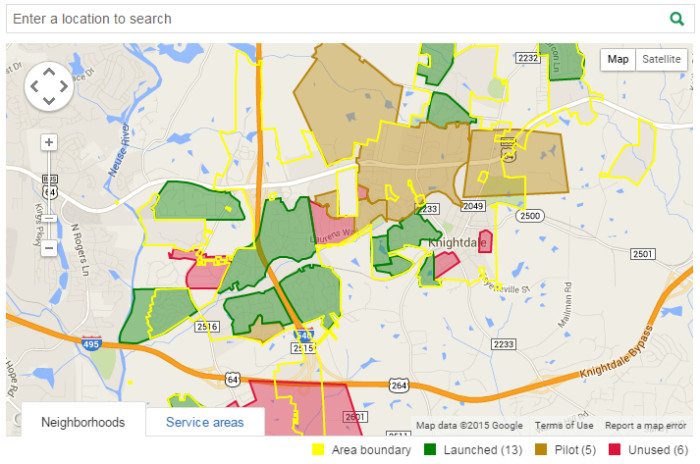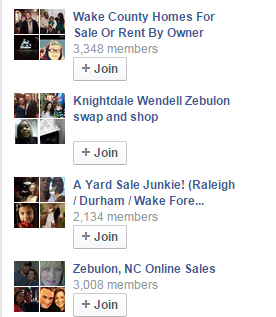
While the need for community engagement remains constant, we have more tools than ever with which to promote it. There are many free applications available to educational institutions, local governments, and non-profits that your stakeholders are using right now. The good news is that participants check these sources regularly; even holidays, nights, and weekends are fair game.
There are plenty of proprietary online engagement tools if your budget allows, but this post focuses specifically on those you can use today at no cost.
Nextdoor
A website that is gaining traction for hyperlocal activities is Nextdoor. Users can access it through the company’s website, Nextdoor.com, and through its app which is available at no cost to Apple and Android subscribers.
Nextdoor is unique in that it focuses on individual neighborhoods. I’ve seen people use it for everything from reporting suspicious activity to making neighbors aware of a well-known person’s death. The site also sends a notification to users any time one of their neighbors creates an account. They can “welcome” the person virtually to the discussion.
The site also allows for more of a macro view for municipalities and counties. Administrators –who must be authorized- can send a message to a specific neighborhood or to many neighborhoods. The site is especially attractive to emergency responders who may want people to know about a gas leak or traffic delay, but communication isn’t limited to such topics. I’ve used it in Knightdale since autumn, 2014, to notify residents of everything from leaf pickup times to our annual holiday activities.
This image shows how neighborhoods are distinguished visually on the Nextdoor map.

The Town of Wake Forest began using Nextdoor in late 2014 and has been happy with its results so far.
“Nextdoor gives us a new channel through which we can both share information and encourage two-way communication,” said Bill Crabtree, Wake Forest Communications and Public Affairs Director.
There is no charge to a municipality or county to set up a Nextdoor account, but administrators need an official email account to get started. The site will be in touch to ensure you are who you claim to be. Any representative of this site will emphasize that they rely on customer trust and the credibility of those who provide content.
While Nextdoor is perhaps the best known for this approach, at least two similar sites are also online; FrontPorchForum and OurCommonPlace appear to be popular in other parts of the US and Canada.
Google+
Google’s social network offers some effective ways to encourage community engagement and it’s very easy to set up. Anyone with a gmail account can access Google+, also known as “Plus”, in just a few seconds.
Plus offers a tool called “Hangouts” that allows you to have a conversation with a group of people via video, phone, or text. You can send invitations directly to members or post a link that reaches larger numbers of people. All you need is web access and the free app. Desktop users don’t even need the app to use hangouts; the platform is integrated into the Plus design seamlessly.
In addition to the hangouts feature, Plus offers a simple interface that shares some similarities with Facebook and Twitter. The intuitive format is a lot like Facebook in that several posts share space on a page that can be personalized. The similarity to Twitter lies in the way connections are made: generally, people follow others they find interesting. They don’t have to know the person offline. With Plus, your post is public to everyone unless you change the privacy settings.
The network doesn’t have quite the penetration as Facebook – there’s roughly one Google+ user for every three Facebook users currently – but it still makes sense in some cases as a good tool for communication.
Facebook Group Pages
Your official Facebook page provides a simple, fast way to post good content; however, there are a growing number of unofficial group pages you may also want to consider. These pages are generally maintained by a resident who created them for a specific purpose. They may be used for anything from selling used items to providing an outlet for community information.
Here are some examples.

The community information pages provide an excellent path for you to disseminate information and seek feedback. Because they’re unofficial, some residents may see them as more trustworthy. The groups work just like your official Facebook page, except you are posting to their wall instead of your own.
Some things to know before you consider an unofficial page:
- You have to post content with your real name. There is currently no way to post content as “County of” or “Friends of”.
- In most cases, you must get permission of the page administrator. Be upfront with him/her about your plans. He/she is likely to appreciate the insight because you’re boosting the page’s relevance and providing content.
- You have no control over reactions to your comment. Like the regular Facebook pages, it’s a good idea to read your content out loud before you post.
An unofficial page doesn’t necessarily have to take the place of your official page. It simply provides an additional path with which to encourage dialogue with your stakeholders. In many cases, a community page will reach more people than your official page.
Final Thoughts
Keep in mind that these third-party sites are for-profit in most cases. If this is a potential obstacle with the people who oversee your organization, it’s a good to touch base with them before investing a lot of time in setting up accounts. Also, be ready to post a disclaimer to these sites, especially if your organization includes emergency personnel such as police and firefighters. While most people know to call 9-1-1 for emergencies – as opposed to tweeting about them- it pays to be explicit in this case.
“Communicating with stakeholders allows them to understand what you are doing and why you are doing it,” said Annette Privette Keller, Communications Director for the City of Kannapolis. “When done correctly stakeholders feel in the know, feel good about their investment in your municipality and proud to be your citizen.”
I’d be interested to hear which sites are working well for your organization. What works in your community? Comments are encouraged and appreciated.
Great article. I’ll try some of these ideas in our community!
I am constantly amazed at the potential for new technologies to provide links between people and between people and their governments. I do worry that in the short-run there are many people much in need of services who will not be connected in this way due to age, income, education or locale. What are people who are developing these technologies doing to try to address these issues?
Hi Katy,
Online is a medium, just like TV, radio, and print. While the reach and accessibility of online tools are fantastic, it will never be ubiquitous. Some folks just like to read a newspaper. Others like to wait in line to vote rather than marking an online ballot. It is up to the proponent – the person driving the consultation – to understand this and ensure efforts are made to give everyone an opportunity to have their say. Therefore, consultations should never be done using an either/or proposition – we’ll run an online forum OR we’ll host a community town hall at the school. Favouring online over offline or vice versa will inevitably skew your results one way or another. You’ll either get a very broad representative sample, but perhaps without a lot of depth – or a very deep sample, without a lot of breadth. Using both face-to-face and online consultation approaches facilitates both a deep and wide consultation with a much higher likelihood of representative community sentiment and support.
That being said, I think internet penetration in the US is somewhere around 87% (2015 numbers). The developers of these online engagement tools can’t influence this kind of reach any more than you or I. However, the proponent driving the engagement project can improve accessibility to consultations by partnering up with local schools, internet cafes, and malls. Libraries, cafes, and community centres can set some of their terminals to the consultation page to capture traffic. They might consider installing kiosks, or asking some facilities to promote the consultation as a public service. For example: retailers could add a small ballot to the bottom of their cash register receipts and ask shoppers to complete the poll and drop the ballot off in a small box. There are lots of creative ways to engage your community – offline and online. It all boils down to time, energy, money, resources… all those precious things we have so little of. 🙂
All great resources, and as you say “… these third-party sites are for-profit in most cases…”. While these tools are excellent for small, grass-roots engagement initiatives, many jurisdictions and governments will need to look deep into how the data is collected and archived. Gathering input is nice, but when the chips are down you might need to have documentation that will back up your claims. Often, free services will make it difficult to extract data for audit purposes – and rightly so since it’s the data that they are after, just as much as you! Because, when the service is free, the product is not the online tool itself, per se, but rather the audience and their feedback that you value.
Have you ever considered publishing an e-book or guest authoring on other
blogs? I have a blog centered on the same subjects you discuss and would really like to have you share some stories/information. I know my audience would value your work.
If you’re even remotely interested, feel free to send me
an e-mail.